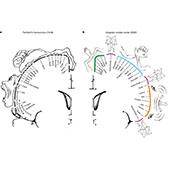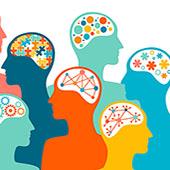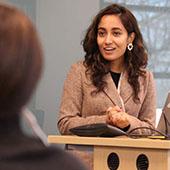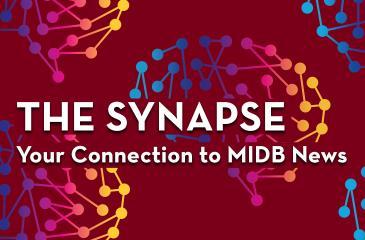Synapse: May 2023
Training Experts to Support the Rare Disease Community
With MIDB as home to the Neurodevelopmental Program in Rare Disease within Clinical Behavioral Neuroscience (CBN), we are extending and growing opportunities to invest in learners to build a community of experts and advocates. Here are a few recent examples of scholarly work in rare diseases:
- Dante Rogers, a MIND Scholar mentored by Rene Pierpont, PhD, LP, and Rebekah L. Hudock, PhD, LP, received a UMN Rare Disease Day Award for his presentation on the clinical presentation and treatment of epilepsy in cardiofaciocutaneous syndrome. He is also working with Pierpont and Adele Dimian, PhD, to analyze data collected from parents and caregivers on challenging behavior presented by children with cardiofaciocutaneous syndrome, with the intention of constructing a poster to submit for this year's RASopathies conference.
- Alli Foy, PhD, a pediatric neuropsychology postdoctoral fellow and member of the MIND Group, received a MIDB Seed Grant for her project, Stakeholder Perspectives on Treatments for Neurocognitive and Behavioral Concerns in RASopathies. In this study, she leads focus groups to discuss treatments that individuals and families have used to address mental and behavioral health concerns.
- Jasmine Hammer, PhD, a pediatric neuropsychology postdoctoral fellow, provides clinical care at MIDB and was inspired to research treatment outcomes when she observed three siblings affected by rare disease who experienced different symptoms based on when they were treated. She presented her findings at last month’s MPS Newborn Screening Meeting, where she also represented learners as a planning committee member.
- Brianna Yund, PhD, LP, is leading a project on MPS disorders that she started during her postdoctoral fellowship in pediatric neuropsychology at the U of M and has continued now that she’s an assistant professor in CBN. She is testing remote assessment of neurocognitive function to enable people to participate even if their rare disease prevents travel. She was recently invited to present her work to the NIH’s Rare Disease Clinical Research Network in June.
- Igor Nestrasil, MD, PhD, is working with a number of learners to help them gain extensive experience in quantitative imaging of the brain and spinal cord in rare disorders.
Additionally, on the clinical side we've heard from families that MIDB’s dedicated and intentional clinical spaces help with medical anxiety—which many patients with rare disease experience due to medical trauma from past procedures. MIDB’s new facility dog, Jersey, has also helped improve childrens’ comfort and anxiety.
MIDB is proud to continue the University’s decades-long commitment to advancing care of people and families touched by rare disease conditions.

International Colloquium Speaker
On May 4, MIDB welcomed its first international speaker to the Colloquium Series. Elaine McCarthy, PhD, provided an in-depth presentation on “Iron Deficiency and the Developing Brain in the First 1,000 Days of Life” and shared the key maternal and early-life factors that influence iron status during this period. McCarthy is a lecturer in nutrition at the School of Food and Nutritional Sciences at the University College Cork in Ireland, where she teaches across undergraduate and postgraduate programs. She is also a lead investigator at the INFANT Research Centre and a principal investigator at the Cork Centre for Vitamin D and Nutrition Research. The recording of McCarthy's talk, along with other prior Colloquium presentations, are on the MIDB Colloquium Series website.

U of M Researchers Discover New Brain Functions That Will Change Neuroscience Fundamentals
For more than 80 years, scientists have relied on the brain map — called the homunculus — to understand which areas of the brain control each body part. A new study published in Nature has identified previously unknown areas of the brain that could help scientists better understand and treat brain conditions including movement disorders, pain, anxiety and more. In the study, scientists including those from MIDB aimed to describe the homunculus in more detail using precision functional mapping, which is a technique used to identify areas in the brain that control specific functions. While their work did locate the separate regions that controlled the movements of the foot, hand and face, they found much more than what the traditional homunculus model displays. Read more about the study.

Non-Profound Autism
Amy Esler PhD, and Jennifer Hall-Lande, PhD, are co-authors on “The Prevalence and Characteristics of Children with Profound Autism, 15 Sites, United States, 2000-2016,” which was published in the peer-reviewed scientific journal Public Health Reports, the official journal of the Office of the U.S. Surgeon General and the U.S. Public Health Service. They found that the percentage of 8-year-old children with profound autism among those with autism was 26.7 percent. Compared with children with non–profound autism, children with profound autism were more likely to be female, from racial and ethnic minority groups, of low socioeconomic status, born preterm or with low birth weight, have self-injurious behaviors, have seizure disorders, and have lower adaptive scores. In 2016, the prevalence of profound autism was 4.6 per 1,000 8-year-olds. Read more about the study. Read more about the study.

Harnessing Uniqueness: MNLEND Fellow Leverages Neuroscience Advances to Explore Brain-Behavior Links
Differences in individual brain structure and function—even within groups of people already diagnosed with autism, for example—create challenges for scientists trying to study how it contributes to functions such as language and social behavior. Thanks to large neuroimaging databases now available at MIDB, however, scientists are beginning to discover patterns that could point to more personalized and effective strategies for regulating emotions, or developing social cognition, among other skills. MIDB Co-Director Damien Fair and Sanju Koirala, a MNLEND fellow at the Institute on Community Integration, recently shared their work in neuroimaging studies with the 2022-23 MNLEND fellowship class. Learn more about their studies.

KudosCongratulations to the awardees of MIDB's Travel Award Program:
- Sally Stoyell, Institute of Child Development (ICD): “Differences in hippocampal volume developmental trajectory by processing pipeline” - Society for Research in Child Development Biennial Meeting 2023
- Trevor Day, ICD: “Crossotope mapping: A novel method for assessing laterality in resting-state fMRI” - Whistler Workshop on Brain Functional Organization, Connectivity, and Behavior
- Ekomobong Eyoh, ICD: “The Longitudinal Acquisition of Social-Emotional Competence in Infants and Toddlers Aged 12-36 months” - Society for Research in Child Development Biennial Meeting 2023
- Morgan Haga, Department of Pediatrics: “Acceptability of Delivering Facing Your Fears via Telehealth for Adolescents with Neurodevelopmental Disabilities During the COVID-19 Pandemic” - Gatlinburg Conference
- Zeynep Basgoze, Psychiatry and Behavioral Sciences: “Development of Affective Processing in Adolescents with Major Depressive Disorder” - SOBP - Society of Biological Psychiatry Conference
- Caroline Roberts, Educational Psychology: “Knowledge Translation for the Treatment of Self-Injurious Behavior and Nonsuicidal Self-Injury” - International Society for the Study of Self-Injury
- Adele Dimian, Institute on Community Integration: “A longitudinal comparison of self-injurious behavior among a clinical cohort of young children with autism and developmental delay” - International Society for Autism Research
- Laura Padilla, Department of Psychiatry: “Effect of Creativity Camp Participation on Amygdala-Frontal Resting-State Functional Connectivity in Adolescents” - 2023 Society of Biological Psychiatry Annual Meeting
- Noel Slesinger, Pediatrics - Pediatric Psychology/Behavioral Neuroscience: “Neurobehavioral Differences in Adolescents with and without Severe Obesity” - Society of Pediatric Psychology Annual Conference
- Sanju Koirala, ICD: “Examining the Measurement Properties of Social Responsiveness Scale in a Convenience Community Sample of Preschool-Aged Children” - International Society for Autism Research (INSAR)

Minnesota Artist Featured in MIDB's Permanent Art Collection, Creativity Camp
The paintings "A Future Honoring All Relations" and "Interconnected" are now part of MIDB's permanent art collection. Created by Moira ("Miri") Villiard, the pieces are part of Villiard's Mahnomen Illustrations collection, a commissioned series exploring wild rice and the Anishinaabe. Villiard is a multidisciplinary artist with a mixed Indigenous and settler heritage who uses art to uplift underrepresented narratives, explore the nuance of society’s historical community intersections, and promote community healing spaces. Last summer, Villiard also joined the Imagination Central class to teach four sessions with adolescents participating in the Creativity Camp held at MIDB. She will join the Creativity Camp again this summer. Read more about Villiard.

Join us in Celebrating Our Scholars & Future Scientists
All are invited to the Annual Young Scientists Poster Symposium Friday, June 2, 2:30-4 p.m., Campbell Hall, room 1. All year, Young Scientists scholars from Ascension Catholic School and U of M mentors collaborate on original research projects in developmental science. They will present their posters at this annual symposium, which includes food and refreshments. RSVP and learn more.
Funding and Award Opportunities
- MIDB Seed Grants - May 15
- MnDRIVE Early Career Research Skills Development Award for Faculty Underrepresented in Medicine and Science - May 17
- MIDB Interdisciplinary Faculty Research Awards - June 1
- Research Technical Staff Award - June 16
- NIH Basic Neurodevelopmental Biology of Circuits and Behavior (R21 Clinical Trial Not Allowed) - July 16 / Oct. 16

Great Community Get Together
Join staff from MIDB, M Health Fairview experts, and patients and community members for a fun-filled summer event in MIDB’s scenic backyard on Tuesday, June 27, 4-6 p.m. In addition to food and refreshments, attendees will have the opportunity to meet Jersey, MIDB’s new facility dog, as well as enjoy a range of activities including face painting, a photo booth, sensory play, a community art project, giveaways, and more. Registration for this event is required. RSVP today.



